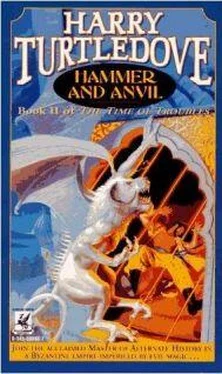"Send out the troops," Lysia said, as if he had complained about a hole in his boot and she had suggested he take it to a cobbler.
"Oh, I will," he said with a long sigh. "And then I'll have the delight of seeing them flee back here to the city with their tails between their legs. I've seen that before, too many times." He sighed again. "I've seen everything before, too many times. It wouldn't take more than a couple of coppers to get me to sail off for Kalavria and never come back."
He had said that before when things looked bleak. Now, all at once, the idea caught fire within him. He could see the mansion up above Kastavala, could hear the gulls squealing as they whirled overhead-oh, gulls squealed above Videssos the city, too, but somehow in a much less pleasant tone of voice-could remember riding to the eastern edge of the island and looking out at the Sailors' Sea going on forever.
The idea of the sea's going on forever had a strong appeal for him now. If there was no land on the far side of the Sailor's Sea-for no one who had ever sailed across it had found any, no one, that is, who had ever come back-he would actually have found one direction from which enemies could not come at him. From his present perch in embattled Videssos the city, the concept struck him as miraculous.
He took Lysia's hands in his. "By the good god, let's go back to Kastavala. Things here will sort themselves out one way or another, and right now I don't much care which. All I want to do is get free of this place."
"Do you really think it's the best thing you could do?" Lysia said. "We've talked of this before, and-"
"I don't care what I said before," Maniakes broke in. "The more I think of leaving Videssos the city now, the better I like it. The fleet will hold Abivard away from the city come what may, and I can command it as well from Kastavala as I can right here where I stand now."
"What will your father say?" Lysia asked.
"He'll say 'Yes, your Majesty,'" Maniakes answered. His father would probably say several other things, too, most of them pungent. He would certainly have something to say about Rotrude. I'll have to deal with her, Maniakes thought. He was surprised Lysia hadn't mentioned her, and mentally thanked her for her restraint. Aloud, he went on, "What's the point of being Avtokrator if you can't do what you think best?"
"Can you be Avtokrator if you don't hold Videssos the city?" Lysia said. That had brought him up short the last time he had thought of removing to Kastavala. Now, though, he said, "Who says I wouldn't hold the city? An Avtokrator on campaign isn't here, but no one rebels against him because of that-well, not usually, anyhow. And the bureaucrats would stay right where they are." He laughed sardonically. "They don't think they need me to run the Empire, anyhow. They'll be glad for the chance to show they're right."
"Do you truly think this is best?" Lysia asked again.
"If you want to know the truth, dear, I just don't know," Maniakes said. "This much I'll tell you, though: I don't see how going to Kalavria could make things much worse than they are now. Do you?"
"Put that way, maybe not." Lysia made a wry face that, for once, had nothing to do with the uncertain stomach her pregnancy had given her. "It shows what a state we've come to, though, when we have to put things that way. It isn't your fault," she added hastily. "Genesios left the Empire with too many burdens and not enough of anything with which to lessen them."
"And I've made mistakes of my own," Maniakes said. "I trusted Etzilios-or didn't mistrust him enough, however you like. I tried to do too much too soon against the Makuraners. I've been hasty, that's what I've been. If I'm operating out of Kastavala, I won't be able to be hasty. News will get to me more slowly, and the orders I send will take their time moving, too. By all the signs, that would make things work better than they do now."
Lysia said, "Well, perhaps it will be all right." With that ringing endorsement, Maniakes got ready to announce his decision to the wider world.
Themistios, the logothete in charge of petitions to the Avtokrator, was a stout, placid fellow. Most of the time, his was a small bureaucratic domain, dealing with matters like disputed tax assessments and appeals such as the one the now probably late Bizoulinos had submitted. Now he presented Maniakes with an enormous leather sack full of sheets of parchment.
"Here's another load, your Majesty," he said. "They'll be coming into my offices by the dozens every hour, too, that they will."
"This is the third batch you've given me today, eminent sir," Maniakes said.
"So it is," Themistios agreed. "People are upset, your Majesty. That's something you need to know."
"I already had an inkling, thanks," Maniakes said dryly. What Themistios meant, at least in part, was that he was upset himself and making no effort to do anything about the flood of petitions begging Maniakes to stay in Videssos the city except passing them straight on to the Avtokrator.
Themistios coughed. "Forgive me for being so frank, your Majesty, but I fear civil unrest may erupt should you in fact implement your decision."
"Eminent sir, I have no intention of taking all my soldiers with me when I go," Maniakes answered. "If civil unrest does pop up, I think the garrison will be able to put it down again."
"Possibly so, your Majesty," the logothete said, "but then again, possibly not." He tapped the pile of petitions. "As is my duty, I have acquainted myself with these, and I tell you that a surprising number of them come from soldiers of the garrison. They feel your departure abandons them to the none too tender mercies of the men of Makuran."
"That's absurd," Maniakes said. "The boiler boys can no more get over the Cattle Crossing than they can fly."
"Your Majesty is a master of strategy," Themistios said. Maniakes looked sharply at him; given the number of defeats he had suffered, he suspected sarcasm. But the logothete seemed sincere. He went on, "Simple soldiers will not realize what is obvious to you. And, if their courage should fail them, what they fear may follow and become fact."
"I shall take that chance, eminent sir," Maniakes replied. "Thank you for presenting these petitions to me. My preparations for the return to Kastavala shall go forward nonetheless."
Themistios muttered something under his breath. Maniakes waited to see if he would say it out loud and force him to notice it. The logothete didn't. Shaking his head, he left the imperial residence.
The next day, Kourikos presented himself to the Avtokrator. After he had risen from his prostration and been granted leave to speak, he said, "Your Majesty, it has come to my attention that you are removing large sums of money in gold, silver, and precious stones from a treasury that, as you must be aware, is painfully low on all such riches."
"Yes, I am, eminent sir," Maniakes said. "If I'm going to center the administration at Kastavala, I'll need money to meet my ends."
"But, your Majesty, you'll leave too little for Videssos the city," Kourikos exclaimed in dismay.
"Why should I care about Videssos the city?" Maniakes demanded. The logothete of the treasury stared at him; that question had never entered Kourikos' mind. For him, Videssos the city was and always would be the center of the universe, as if Phos had so ordained in his holy scriptures. Maniakes went on, "What have I ever had here except grief and trouble?-from you not least, eminent sir. I shall be glad to see the last of the city, and of you. I tell you to your face, I thought the one who conspired with my brother was you, not Tzikas."
"N-not I, your Majesty," Kourikos stammered. He was suddenly seeing that having a family connection to the Avtokrator could bring danger as well as advantage. "I-I do not agree with what you have done, but I do not seek to harm you or plot against you. You are father to my grandchildren, after all."
Читать дальше












